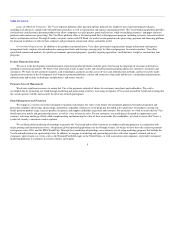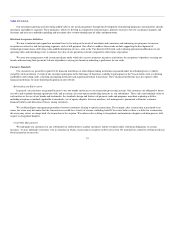Visa 2009 Annual Report Download - page 20
Download and view the complete annual report
Please find page 20 of the 2009 Visa annual report below. You can navigate through the pages in the report by either clicking on the pages listed below, or by using the keyword search tool below to find specific information within the annual report.
Table of Contents
Limitations on our business and other penalties resulting from litigation or litigation settlements may materially and adversely affect our revenues
and profitability.
Certain limitations have been placed on our business in recent years as a result of litigation and litigation settlements. For example, as a result of the
June 2003 settlement of a U.S. merchant lawsuit against Visa U.S.A., merchants are able to reject Visa consumer debit cards in the United States while still
accepting other Visa-branded cards, and vice versa. In addition, following the final judgment entered in the litigation the DOJ brought against Visa U.S.A. and
Visa International in 1998, as of October 2004, members of Visa U.S.A. may issue certain competing payment cards. Since this final judgment, several
members of Visa U.S.A. have begun to issue, or have announced that they will issue, American Express or Discover-branded cards. See Note 21—Legal
Matters to our consolidated financial statements included in Item 8 of this report.
These and any future limitations on our business resulting from settlements of, or judgments in, pending or potential litigation could limit the fees we
charge and reduce our payments volume, which could materially and adversely affect our revenues, operating results, prospects for future growth and overall
business.
Tax audits or disputes, or changes in the tax laws applicable to us, could materially increase our tax payments.
We exercise significant judgment in calculating our worldwide provision for income taxes and other tax liabilities. Although we believe our tax
estimates are reasonable, many factors may decrease their accuracy. We are currently under audit by the IRS and other tax authorities and may be subject to
additional audits in the future. The tax authorities may disagree with our tax treatment of certain material items and thereby increase our tax liability. In
addition, changes in existing laws, such as recent proposals for fundamental U.S. and international tax reform, may also increase our effective tax rate. A
substantial increase in our tax burden could have an adverse effect on our financial results. See also Note 20—Income Taxes to our consolidated financial
statements included in Item 8 in this report.
The payments industry is the subject of increasing global regulatory focus, which may result in the imposition of costly new compliance burdens on
our customers and us and may lead to increased costs and decreased payments volume and revenues.
Regulation of the payments industry has increased significantly in recent years. Examples of such regulation include:
• Anti-Money Laundering Regulation. This includes the U.S.A. PATRIOT Act and similar regulations in most other countries in which Visa
operates.
• U.S. Treasury Office of Foreign Assets Control Regulation. Regulations imposed by the U.S. Treasury Office of Foreign Assets Control, or
OFAC, restrict Visa U.S.A. and Visa International from dealing with certain countries, and parties considered to be connected with money
laundering, terrorism or narcotics. Non-U.S. Visa International members may not be similarly restricted, so our payments system may be used for
transactions in or involving countries or parties subject to OFAC-administered sanctions.
• Regulation of the Price of Credit. Many jurisdictions in which our cards are used have new or proposed regulations that could increase the costs
of card issuance or decrease the flexibility of card issuers to charge interest rates and fees on credit card accounts. These include the Credit
CARD Act and proposed regulations thereunder and proposed changes to the Federal Truth in Lending Act, which, if implemented along with
regulations required to be promulgated under the Credit CARD Act, could result in a decrease in our payments volume and revenues.
19
























